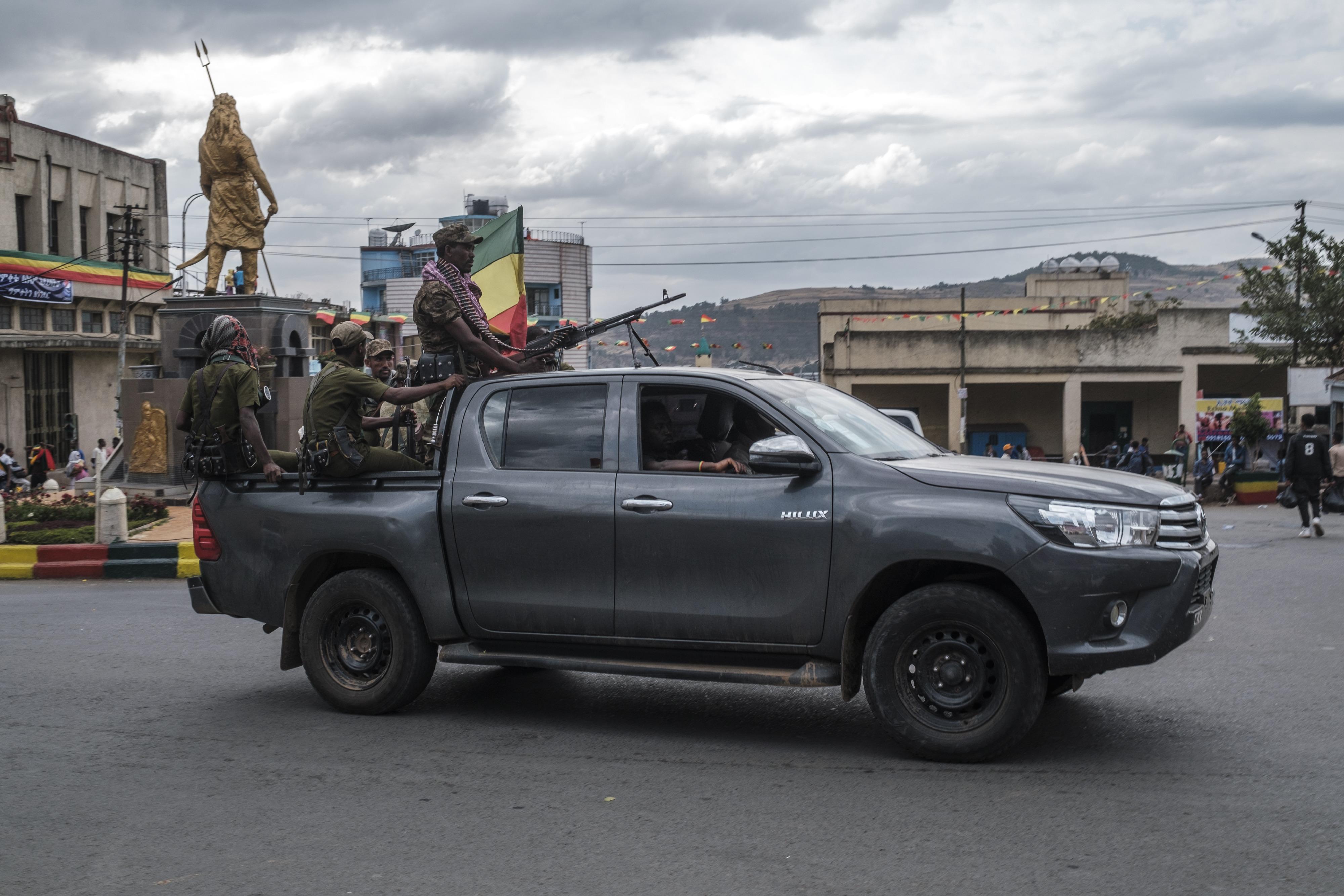 Members of the Amhara militia ride in the back of a pick up truck in the city of Gondar, Ethiopia, on January 17, 2022. (PHOTO / AFP)
Members of the Amhara militia ride in the back of a pick up truck in the city of Gondar, Ethiopia, on January 17, 2022. (PHOTO / AFP)
ADDIS ABABA - The Ethiopian House of People's Representatives (HoPR) on Monday ratified a six-month state of emergency rule in the northern Amhara region amid the prolonged conflicts between the military and local militiamen.
In its extraordinary session, the HoPR, the lower house of the Ethiopian parliament, examined and ratified the rule following Ethiopian Council of Ministers' announcement of a state of emergency on Aug 4, pending endorsement by the HoPR.
While explaining the necessity of the rule to members of the parliament, Chief Government Whip Tesfaye Beljige said that the armed illegal activities in Amhara have become impossible to control through the regular law enforcement system.
While explaining the necessity of the rule to members of the parliament, Chief Government Whip Tesfaye Beljige said that the armed illegal activities in Amhara have become impossible to control through the regular law enforcement system
The armed confrontation has greatly threatened the constitutional order of the East African country and disrupted the overall economic and social activities of the residents in the region, he said.
ALSO READ: China, Ethiopia vow to promote peace in Horn of Africa
The Council of Ministers said it is necessary to take emergency measures to maintain public peace and security and enforce law and order.
It also disclosed that the move followed the formal request by the Amhara regional government, calling on the federal government to "take appropriate measures" in response to the expanding clashes.
Suspected air strike kills 26
A suspected air strike at the weekend in Ethiopia's Amhara region killed at least 26 people, a hospital official said on Monday, as a state-appointed rights group detailed widespread killings of civilians since fighting broke out this month.
Federal forces managed late last week to push Fano militiamen out of most major towns in Amhara, but clashes continue in other parts of the region, the Ethiopian Human Rights Commission (EHRC) said in a statement.
The fighting, which has been fuelled by Fano accusations that the federal government is trying to weaken Amhara's defences, is Ethiopia's biggest security crisis since a two-year civil war in the northern Tigray region ended last November.
READ MORE: Ethiopia, partners to probe alleged aid misappropriation
Ethiopia's government denies the allegations by Fano, an informal militia that backed federal forces during the Tigray war. Spokespeople for the government, the military and Prime Minister Abiy Ahmed did not respond to requests for comment on Monday about the suspected air strike or EHRC's statement.
The suspected strike hit the town centre of Finote Selam on Sunday, said the hospital official, who asked not to be named for security reasons.
The hospital official said four people died at the hospital and another 22 either at the scene or on their way to hospital. Fifty-five more are being treated for injuries sustained in the explosion, the official said.
READ MORE: UN appeals funding to help people fleeing Sudan to Ethiopia
Tikikil Kumlachew, a university teacher who was visiting a relative in the hospital from an unrelated incident, said he had seen 14 bodies there and been told by a medical worker that another 12 had died.
"The explosion shook the city. I don't know if it was a drone or something else. But it fell from the sky," he said.
In its statement on Monday, the EHRC said it had received credible reports that strikes and shelling in Finote Selam and other towns had resulted in civilian casualties, without specifying when these events occurred.
READ MORE: Violent clashes in Ethiopia's Amhara as unrest deepens
EHRC's statement said its investigators had documented a variety of incidents since the conflict started, including the killing of protesters who blocked roads, the looting of weapons and ammunition from police stations and prisons, and the targeting of Amhara regional administration officials.
In Amhara's capital Bahir Dar, civilians were killed on the streets or outside their houses, EHRC said, adding there were credible reports of "many civilian casualties" in Gondar, the region's second biggest city, and extra-judicial killings by security forces in Shewa Robit.
In Addis Ababa, the capital, there have also been widespread arrests of civilians of ethnic Amhara origin, it said.


